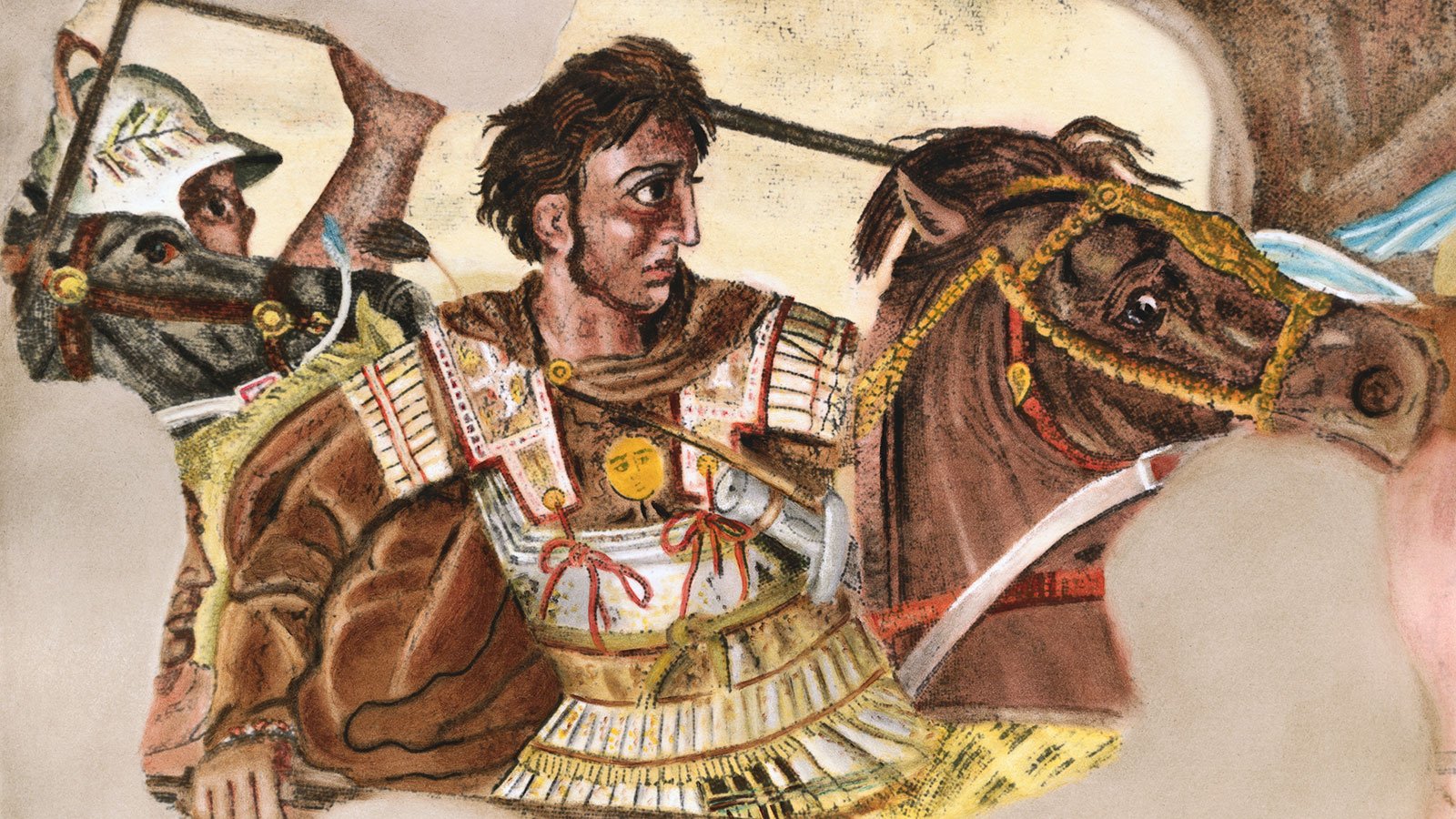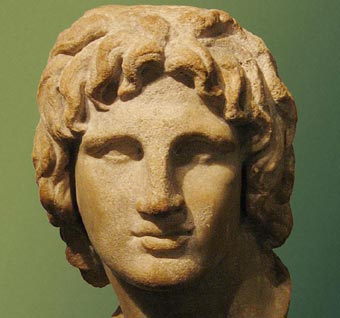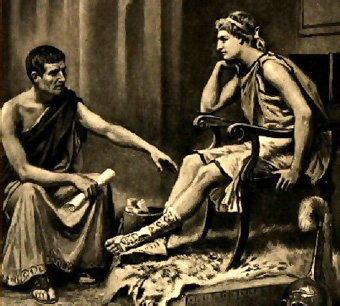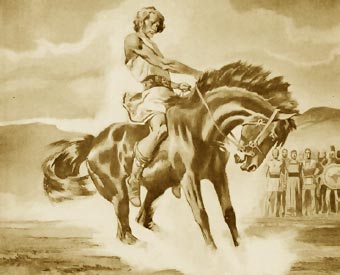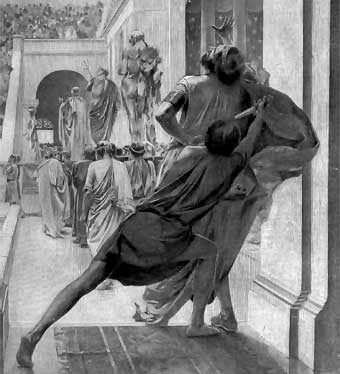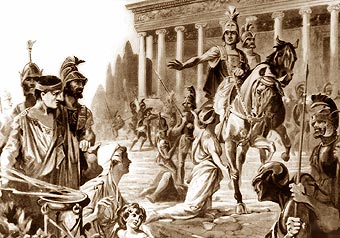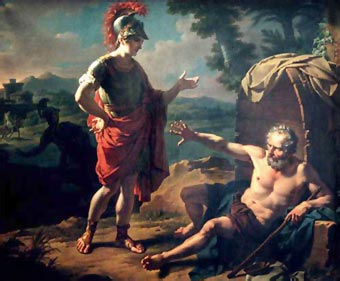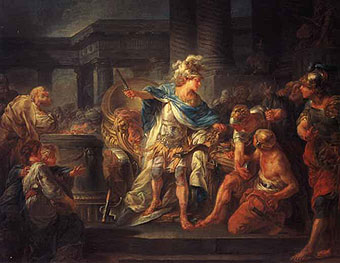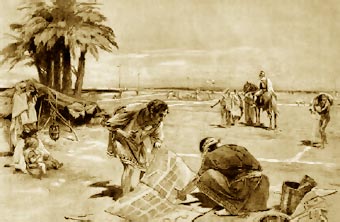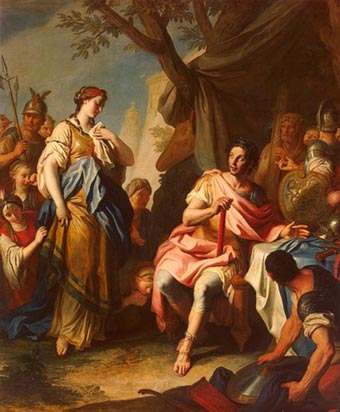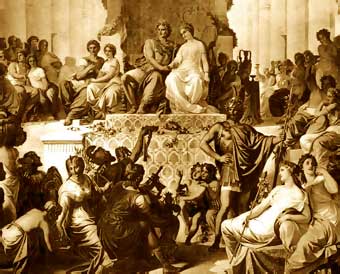For the history of ancient civilization, the exploits of Alexander the Great were a whirlwind of such proportions that even today it is possible to speak without palliative of a before and an after of his passage through the world. And although his providential legacy (the extension of Hellenic culture to the most remote confines) was favored by a whole range of favorable circumstances that historians point out from time to time, his biography is truly a true epic, the manifestation in time of the fantastic Homeric visions and the living example of how some men excel over their contemporaries to incessantly feed the imagination of future generations.
Alexander the Great
Towards the second half of the 4th century BC, a small territory in northern Greece, despised by the haughty Athenians and labeled a barbarian, began its brilliant expansion under the aegis of a military man of genius: Philip II, King of Macedonia. The key to his military successes was the perfection of the “oblique order of battle”, previously experienced by Epaminondas. It consisted in arranging the cavalry in the attacking wing, but above all in providing mobility, reducing the number of ranks, to the infantry phalanxes, which until then could only maneuver in one direction. The famous Macedonian phalanx was made up of lines of sixteen men at the bottom with iron helmets and shields, and a spear called a sarissa.
Alexander was born in Pela, capital of the ancient Macedonian region of Pelagonia, in October 356 BC. That year brought many congratulations to the ambitious Macedonian community: one of its most renowned generals, Parmenion, defeated the Illyrians; one of its riders was the winner at the Games held in Olympia; and Philip had his son Alexander, who in his imposing warrior career would never know defeat.
Legend has it that, on the same day that Alexander was born, an extravagant arsonist set fire to one of the Seven Wonders of the World, the temple of Artemis in Ephesus, taking advantage of the absence of the goddess, who had come to guard the birth of the prince. When he was arrested, he confessed that he had done it to make his name go down in history. The authorities executed him, ordered that even the most recondite testimony of his passage through the world disappear and prohibited anyone from ever saying his name. But more than two thousand years later the infamous outrage of the disturbed Erostratus is still remembered, and the priests of Ephesus, according to legend, saw in the catastrophe the unmistakable symbol that someone, somewhere in the world, had just been born to reign over all the East. According to another description, that of Plutarch,
Born to conquer
Predestined by gods and oracles to rule two empires at the same time, the confirmation of this exceptional destiny seems today more attributable to its own peculiar reality. Grandson and son of kings at a time when the aristocracy was made up of warriors and conquerors, he was prepared for it since he saw the light.
At the time of birth, his father, Philip II, general of the army and brand-new King of Macedonia, to whose throne he had acceded months before, was away from Pela, on the Chalkidian peninsula, celebrating with his soldiers the surrender of the Greek colony. of Potidea. Upon receiving the news, full of joy, he immediately sent to Athens a letter addressed to Aristotle, in which he shared the fact and thanked the gods that his son had been born in his time (that of the philosopher), and transmitted the hope that one day he would become his disciple. His mother, Queen Olympias of Macedonia, was the daughter of Neoptolomeo, King of Molosia, and, like her father, determined and violent. He closely watched the education of his children (soon to be born Cleopatra, Alexander’s sister) and instilled in them his own ambition.
The prince had first in Lysimachus and then in Leonidas two severe pedagogues who subjected his childhood to a rigorous discipline. Nothing superfluous. Nothing frivolous. Nothing to induce sensuality. From an irritable and emotional nature, this austerity seemed to suit his character, and he acquired a perfect control of himself and his actions.
Aristotle and Alexander
When, when he was twelve years old, the king, until then away from his side due to his constant military campaigns, decided to dedicate himself personally to his education, he marveled at finding himself in front of an intelligent and courageous child, full of judgment, extraordinarily gifted and interested in what was happening around him. It was the right moment to entrust Aristotle with the education of his son. From the age of thirteen to seventeen, the prince practically lived with the philosopher. He studied grammar, geometry, philosophy and, especially, ethics and politics, although in this sense the future king would not follow the conceptions of his tutor. Over the years, he would confess that Aristotle taught him to “live with dignity”; he always felt sincere gratitude for the Athenian thinker.
Aristotle also taught him to love the poems of Homer, in particular the Iliad, which in time would become a true obsession of the adult Alexander. The new Achilles was once questioned by his master regarding his plans for him when he had attained power. The prudent Alexander replied that when the moment came he would give him an answer because man can never be sure of the future. Aristotle, far from nurturing suspicions about this reticent reply, was extremely pleased and prophesied that he would be a great king.
Alexander was growing while the Macedonians increased their dominions and Philip his glory. From an early age, his appearance and courage were compared to those of a lion, and when he was only fifteen years old, according to Plutarco, an anecdote took place that anticipates his dazzling future. Philip wanted to buy a handsome wild horse, but none of his brave riders could tame it, so he had decided to give it up. Alexander, infatuated with the animal, wanted his chance to ride it, although his father did not believe that a boy would succeed where most veteran had failed. To the amazement of all, the future conqueror of Persia climbed on the back of his long-time inseparable friend, Bucephalus, and galloped over him with unexpected ease.
The taming of Bucephalus
Healthy, robust and of great beauty (always according to Plutarco), Alexander would incarnate, at the age of sixteen and seventeen, the prototype of the ideal young man. In full force of Dorian love, already enriched by Plato with his philosophy, and himself descended from Dorians with a teacher who, in turn, had been Plato’s favorite disciple for twenty years, it is not difficult to imagine his sexual awakening. Already through reciprocal admiration with Aristotle himself, already providing him with other boys as a formative method of his spirit, he would only have characterized, at the time and in the warrior society in which he lived, the role corresponding to his age and condition.
If, as Plato argued, this type of love promoted heroism, in Alexander, during those years, the awakening of the hero was imminent. At sixteen he felt qualified to lead a war, and with sufficient mastery and judgment to reign. He was able to try both very soon. His father was wounded in Perinton, he was called to replace him. It was the first time he had taken part in combat, and his conduct was so brilliant that he was sent to Macedonia as regent. In 338 he marched with his father south to subdue the tribes of Anfisa, north of Delphi.
Since 380 BC, a visionary Greek, Isocrates, had preached the need for internal fighting on the peninsula to be abandoned and for a panhellenic league to be formed. But decades later, the Athenian Demosthenes He showed his concern for the conquests of Philip, who had seized the north coast of the Aegean. Demosthenes, a declared enemy of Philip, took advantage of the distance to induce the Athenians to arm themselves against the Macedonians. When the king found out, he set out with his son to Queronea and fought with the Athenians. The glorious Theban phalanxes, undefeated since their formation by the brilliant Epaminondas, were completely devastated. Even the last Theban soldier died at the Battle of Queronea, where the young Alexander commanded the Macedonian cavalry.
Alexander knew how to win the admiration of his soldiers in this war and acquired such popularity that the subjects commented that Philip was still their general, but that their king was already Alexander. Quinto Curcio tells that after the triumph in Queronea, where the prince had shown, despite his youth, to be not only a heroic combatant but also a skillful strategist, his father hugged him and with tears in his eyes told him: « My son, find yourself another kingdom worthy of you. Macedonia is too small! ‘
After the campaigns against Thracians, Illyrians and Athenians, Alexander, Antípatro and Alcímaco were appointed delegates of Athens to manage the peace treaty. It was then that he first saw Greece in all its splendor. The Greece she had learned to love through Homer. The land of which Aristotle had transmitted his pride and passion. In his brief tenure, he was paid great honors. There he attended gyms and lectures and practiced pentathlon sports, under the watchful and admiring gaze of adults, who transformed these centers into true “love courts”. There he was in direct contact with the art in full swing of Praxiteles and with the preliminary moments of the Attic school.
The murder of Philip
Philip, meanwhile, had brought all of Greece, with the exception of Sparta, under his authority. In 337, at the age of forty-five, he had been carrying a passion since his passage through the Adriatic mountains, and he did not hesitate to return to Illyria in search of Atala, the princess with whom he had fallen in love. After twenty years of marriage (although very few of them were close to his wife and the disagreements were increasing), he did not hesitate to repudiate Olympias and celebrate a new wedding with Atala.
Alexander, who loved his mother, could not bear the offense that the king inflicted on his legitimate wife. Despite this, he was forced to attend the wedding banquet. During the ceremony, he criticized his father’s performance, and he, drunk, came to threaten him with his sword. Outraged, his self-esteem wounded, the prince ran to his mother’s side and begged her to flee with him. With a few faithful people, mother and son left Pela to take refuge in the palace of their uncle Alexander, king of Molossia in a succession of his maternal grandfather.
They lived there until Philip, showing repentance, promised to pay the queen the honors that were due him. However, although Olympias agreed, it is very possible that he already conspired with Pausanias for the perpetration of his revenge against Philip and the crystallization of his regency ambitions. A few weeks later (it was already the spring of the year 336) they all returned to Epirus, including Philip. The wedding of his daughter Cleopatra was celebrated with Alexander of Molosia, uncle of the bride. During the wedding procession, Philip II was assassinated by Pausanias.
The murder of Philip
It seems clear that Olympias participated (perhaps was the mentor) in the assassination of the king. But Alejandro, was he alien? At the age of twenty he took over the kingdom of Macedonia: almost a divine design to finally begin the life of glory to which he felt destined. And immediately he went to work. In the first place (here Quintus Curcio Rufo says that he “gave punishment, by himself, to the murderers of his father”, but it does not seem reliable), he had all those who might oppose him eliminate. The year 336 had not ended when the popular assembly of Corinth had himself designated “Generalissimo of the Greek armies.”
King of macedonia
At the beginning of the year 335, the uprising of Thrace and Illyria demanded a short campaign from him, during which he achieved the conquest and submission of both regions. He had not just returned to his kingdom when the uprising of the Thebans, together with that of the Athenians, after spreading the rumor of his death in Icaria, demanded a new and urgent battle to prevent the total coalition.
But the siege of Thebes was not easy; Thrace and Illyria had been child’s play by comparison. Faced with the resistance of the city, Alexander decided to take it by storm. He put to the knife, one by one, more than six thousand citizens, reduced to slavery a garrison made up of thirty thousand soldiers and ordered the total demolition of the city, although, in a more than eloquent act of his respect for art and culture, ordered to save from the demolition the house in which Pindar, the Greek poet of Cinocephalos, had lived, who sang with great lyrical beauty to the athletes in his Epinices (or “songs of the sports arena”) and that was counted among his favorite poets. Athens submitted without resisting.
Alexander in Thebes
Upon returning to Macedonia, he worked in preparation for the war against the Persian Empire, a campaign started by his father (for whom it had been his life’s dream), and which had been interrupted after his death. It is possible that between the final months of 335 until the spring of 334 he had made different trips to Epirus and Athens. In Epirus his sister Cleopatra, the queen of Molosia, reigned, who counted on his advice. In Athens Lysippus, the sculptor of Sicione and friend of Alexander, made of him several busts, some of which could date from that time.
The conquest of the Persian Empire
While preparing his departure for Persia he was informed that the statue of Orpheus, the lyre player, was sweating, and Alexander consulted a fortune teller to find out the meaning of this premonition. The augur predicted a great success in his endeavor because the divinity manifested with this sign that it would be difficult for the poets of the future to sing his exploits. After entrusting his general Antipater to keep Greece in peace, in the spring of 334 BC he crossed the Hellespont with thirty-seven thousand men willing to avenge the offenses inflicted by the Persians on their homeland in the past. I would never return. Alexander occupied Thessaly and declared to the local authorities that the Tesalo people would be forever tax-free. He also swore that, like Achilles,
When they arrived in Corinth, Alexander wanted to meet the great philosopher Diogenes, famous for his proverbial contempt for wealth and conventions, who, although he was in his eighties, retained his intellectual faculties. Sitting under a shed, warming himself in the sun, Diogenes looked at the king with complete indifference. According to Plutarch, when the monarch told him: “I am Alexander, the king,” Diogenes replied: “And I am Diogenes, the Cynic.” “Can I do something for you?” Alejandro asked him, and the philosopher replied: “Yes, you can do me the favor of leaving, because with your shadow you are taking away the sun.” Later the king would say to his friends: “If it were not Alexander, he would like to be Diogenes.”
Alexander and Diogenes
Sometime later, another unique anecdote offers a new legendary dialogue, but this time with Dionides, a famous pirate among the Carians, the Tyrrhenians and the Greeks, who, captured and brought into his presence, was not daunted by the king’s admonition when He said, “By what right do you plunder the seas?” Dionides replied: “With the same one with which you plunder the earth”; But I am a king and you are only a pirate. “We both have the same job,” replied Dionides. If the gods had made me a king and you a pirate, I would perhaps be a better sovereign than you, whereas you would never be a skilled and nonjudgmental pirate as I am. ” They say that Alexander, by way of answer, forgave him.
In June 334 he achieved the victory of the Granicus, over the Persian satraps. In the noisy and bloody battle Alexander was about to perish, and only the timely help at the last moment of his general Clito saved his life. Halicarnassus also conquered, he went to Phrygia, but before, on his way through Ephesus, he was able to meet the famous Apelles, who would become his particular and exclusive painter. Apelles lived at court until Alexander’s death.
At the beginning of 333, Alexander arrived with his army in Gordión, city that was court of the legendary king Midas and important commercial post between Ionia and Persia. There the Gordians presented the invader with a seemingly insoluble dilemma. An intricate knot tied the yoke to the chariot of Gordius, King of Phrygia, and from ancient times it was claimed that whoever was able to undo it would rule the world. All had failed so far, but the intrepid Alexander could not avoid the temptation to unravel the riddle. With an accurate and violent blow executed with the edge of his sword, he cut the rope, and then commented sarcastically: “It was that simple.” Alexander thus affirmed his claims of universal dominion.
Alexander cutting the Gordian knot
(oil by Jean-Simon Berthélemy)
He crossed the Taurus, crossed Cilicia and, in the autumn of 333 BC, the great battle against Darius III, king of Persia, took place on the plain of Issos. Before the confrontation he harangued his troops, fearful for the bulky numerical superiority of the enemy. Alexander hoped for victory because he was convinced that the crowds could do nothing against intelligence and that a coup of audacity would tip the balance on the side of the Greeks. When the outcome of the contest was still uncertain, the coward Darius fled, abandoning his men to catastrophe. The cities were sacked and the king’s wife and daughters were taken hostage, so that Darius was forced to present Alexander with extraordinarily advantageous peace conditions for the victorious Macedonian. He gave her the western part of his empire and the most beautiful of his daughters as a wife. The noble Parmenion found it a satisfactory offer, and advised his boss: “If I were Alexander, I would accept.” To which he replied: “And so would I if I were Parmenion.”
Alexander wanted to dominate all of Persia and could not settle for this honorable treaty. To do this, he had to take control of the eastern Mediterranean. He destroyed the city of Tire after seven months of siege, took Jerusalem and entered Egypt without encountering any resistance: preceded by his fame as a victor over the Persians, he was welcomed as a liberator. Alexander presented himself as the protector of the ancient religion of Amun and, after visiting the temple of the oracle of Zeus Amun in the oasis of Siwa, located in the Libyan desert, his divine affiliation was proclaimed in the purest pharaonic style.
This visit to a sanctuary, whose titular god was not purely Egyptian, had an undoubted political purpose. Alexander the Great, as a good politician, could not pass up the opportunity to increase his prestige and popularity among the Hellenes, many of whom were reluctant to him. It is said that after requesting the consultation of the oracle, the priest responded with the greeting reserved to the pharaohs, treating him as “son of Ammon.” Then (the legend continues), he entered the building alone and listened attentively to the answer “according to his wish”, as Alexander himself would declare. On this visit and on the scope of the prophecy rivers of ink have been spilled. Most historians agree that there the oracle would have informed the Macedonian of its divine origin, and predicted the creation of his Universal Empire. The fact is that no text is known that provides information about the words of the oracle.
Returning through the western end of the delta, he founded, in an admirable natural setting, the city of Alexandria, which became the most prestigious in Hellenistic times. To determine its location, he relied on the inspiration of Homer. He used to say that the poet had appeared to him in his dreams to remind him of some verses from the Iliad : “In the resonant Pontus / there is an island opposite Egypt / Faro with the distinguished name .“On the island of Faro and on the nearby coast he planned the city that was to be the capital of Hellenism and the meeting point between East and West. As they could not delimit the urban perimeter with lime, Alexander decided to use flour, but the birds they came to eat it, destroying the established limits.This event was interpreted as an omen that the influence of Alexandria would spread throughout the Earth.
Alexander draws the limits of the future Alexandria
In the spring of 331 he had already left Macedonia for three years, with Antipater as regent; but neither then nor later does he seem to have thought of returning. He continued his exploration across the Euphrates and the Tigris, and on the plain of Gaugamela he faced the last of Darius III’s armies, bringing to an end, at the Battle of Arbelas, the Achaemenid dynasty. The impressive Persian troops this time had a terrifying strike force: elephants.
Parmenion was in favor of attacking under the cover of darkness, but Alexander did not want to hide his victories from the sun. That night he slept confidently and peacefully while his men marveled at his strange serenity. A brilliant plan had matured to avoid the enemy’s maneuvers. His best weapon was the swiftness of the cavalry, but he also counted on the weak fortitude of his opponent and planned to head the army at the first opportunity. Indeed, Darío once again showed himself weak and fled before the proximity of Alexander, suffering a new and infamous defeat. All the capitals were opened to the Greeks. While entering Persepolis, Alexander ordered to occupy Susa, Babylon and Ecbatana almost simultaneously. In July 330, Darío was assassinated. Kiss, the satrap of Bactriana,
Alexander the Great and Roxana (1756), by Pietro Rotari
Alexander then subdued the eastern provinces and continued his march eastward. Many were the anecdotes and legends that from then on were accumulating around this demigod who seemed invincible. History shows that he wore the Persian stole, a garment strange to Greek customs, to symbolize that he was king of both. We know that, driven by revenge, he ordered the city of Persepolis burned; that, furious, he killed with a spear Clito, the one who had saved his life in Gránico; who had Callisthenes executed, the philosopher nephew of Aristotle, for having composed verses alluding to his cruelty, and who married a Persian princess, Roxana, contrary to the expectations of the Greeks. Alexander even went into India, where he had to fight against the noble Hindu king Poros. As a consequence of the tragic battle, his faithful horse Bucephalus died, in whose honor he founded a city called Bucephala.
The return
But his army, as new Alexandrians were founded in his wake, was losing men. They felt exhausted, weakened, until in 326, when he reached Hifasis (the easternmost point he would ever reach), he had to resume his return path after the mutiny of his soldiers. During the return, the army was divided: while General Nearco looked for the route by sea, Alexander led the bulk of the troops through the infernal desert of Gedrosia. Thousands of men died in the endeavor. The thirst was more devastating than the enemy spears. Although decimated, the army managed to reach its destination, and with the celebration of the weddings of eighty generals and ten thousand soldiers the conquest of the East was concluded.
Already in Babylon, he did not hesitate to have the Macedonians who opposed him executed. His project was to create a new army made up of Hellenes and barbarians to abort the Macedonian traditions of freedom. He wanted to build a mixed nation, and he took up the Achaemenid ritual while seeking and gaining support from eastern families. He believed in this way to ensure the success of his plans for universal domination. Although he continued his campaigns and continued to project new ones until, on his deathbed, he could no longer speak, there was an event, however, that would crumble all his certainties: the death of Hephaestion.
Alexander had married Roxana during a campaign in Bactra, from whose union Alexander IV, their only son, would be born posthumously. He also married Statira, in Susa, when, driven by his desire for racial integration, he had several marriages celebrated between his Macedonian soldiers and oriental women. Statira was the eldest daughter of Darío III; Dripetis, also married then to Hephaestion, the youngest. He trusted Ptolemy, a relative of his (perhaps his stepbrother) and an officer in his high command. He also had in Nearco, one of his officers, a comrade and friend since childhood. But Hephaestion had been more than all of them: his friend, perhaps his lover, but above all an intelligent man who shared his ideas as a statesman; both experienced mutual admiration.
The weddings of Susa: Alexander married
Statira; Hephaestion, with Dripetis
The death of Hephaestion in October 324, while they were in Ecbatana, caused him such deep pain that he himself was declining until his own death, which occurred a few months later. In 325, on returning from India, during his march along the Indus he had received a dangerous chest wound; his return through the desert of Gedrosia in extreme conditions again broke his health. Almost at the end of the summer of 324, he decided to rest for a while and settled in the summer palace of Ecbatana, accompanied by Roxana and her friend Hephaestion. His wife became pregnant. His friend suddenly fell ill and died. Alexander took the body to Babylon and arranged for Hephaestion’s funeral.
He immediately began a new campaign exploring the coasts of Arabia. While sailing the Lower Euphrates he contracted a malarial fever that would be fatal. Before dying, in June 323, in a still imposing but already demolished ziggurat at Bel-Marduk, Alexander, now less imposing, gave his royal ring to Perdiccas, his lieutenant since the death of Hephaestion. Alexander was thirty-three years old. Beside him was Roxana. Statira remained in Susa, in the harem of the palace of her grandmother Sisigambis. Behind the walls that guarded the inner city, the Euphrates continued to flow. That same day, free of fabulous hopes, with nothing to bequeath to men except his paltry barrel, at almost ninety years old, his bleak counterpart, the frowning philosopher Diogenes the Cynic, also died in Corinth.
The strange phenomenon of the non-corruption of Alexander’s body, even more, remarkable with the prevailing heat in Babylon, would have led, in Christian times, when believing that it was a miracle, to sanctify it. In the fourth century BC, no such tradition existed to attract the attention of hagiographers. Perhaps the most accurate explanation is that his clinical death occurred much later than was believed then.
Alexander IV, his son, and Roxana, his wife, were murdered by Cassander when the boy was thirteen years old, in 310 BC Cassander was the eldest son of Antipater, regent when Alexander the Great left for Asia, and after that murder, he was king from Macedonia. Cleopatra, his sister, continued to rule Molosia for many years after King Alexander died. Olympias, his mother, disputed the regency of Macedonia with Antipater and in 319 BC he allied with Polyperchon, the new regent; When she had achieved the goal pursued throughout her life, she was executed in 316 BC in Pidnia. To Ptolemy, an officer of his high command, is owed a History of Alexander; Ptolemy would later be king of Egypt, where he started a dynasty, that of the Ptolemies, which would last until 30 BC, the year of the death of the famous Cleopatra, the last queen of Egypt.




